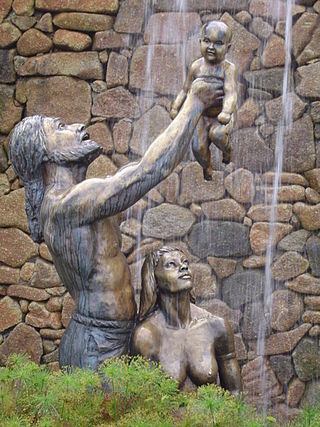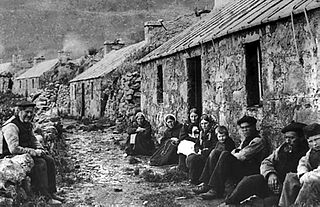
Creole peoples are ethnic groups formed during the European colonial era, from the mass displacement of peoples brought into sustained contact with others from different linguistic and cultural backgrounds, who converged onto a colonial territory to which they had not previously belonged.

Mestizo is a term used for ethno-racial classification to refer to a person of mixed European and Indigenous American ancestry. In certain regions such as Latin America, it may also refer to people who are culturally European even though their ancestors are not. The term was used as an ethno-racial exonym for mixed-race castas that evolved during the Spanish Empire. Although, broadly speaking, mestizo means someone of mixed European/Indigenous heritage, the term did not have a fixed meaning in the colonial period. It was a formal label for individuals in official documents, such as censuses, parish registers, Inquisition trials, and others. Priests and royal officials might have classified persons as mestizos, but individuals also used the term in self-identification.
Multiracial people are people of more than one race. A variety of terms have been used both historically and presently for mixed race people in a variety of contexts, including multiethnic, polyethnic, occasionally bi-ethnic, Métis, Muwallad, Colored, Dougla, half-caste, ʻafakasi, mestizo,, mutt, Melungeon, quadroon, octoroon, sambo/zambo, Eurasian, hapa, hāfu, Garifuna, pardo, and Guran. A number of these terms are now considered offensive, in addition to those that were initially coined for pejorative use.
Anglo is a prefix indicating a relation to, or descent from, the Angles, England, English culture, the English people or the English language, such as in the term Anglosphere. It is often used alone, somewhat loosely, to refer to people of British descent in Anglo-America, the Anglophone Caribbean, South Africa, Namibia, Australia, and New Zealand. It is used in Canada to differentiate between the French speakers (Francophone) of mainly Quebec and some parts of New Brunswick, and the English speakers (Anglophone) in the rest of Canada. It is also used in the United States to distinguish the Latino population from the non-Latino white majority.

The French people are a Romance ethnic group and nation primarily located in Western Europe that share a common French culture, history, and language, identified with the country of France.

New Zealanders, colloquially known as Kiwis, are people associated with New Zealand, sharing a common history, culture, and language. People of various ethnicities and national origins are citizens of New Zealand, governed by its nationality law.
Burgher people, also known simply as Burghers, are a small Eurasian ethnic group in Sri Lanka descended from Portuguese, Dutch, British and other European men who settled in Ceylon and developed relationships with native Sri Lankan women. The Portuguese and Dutch had held some of the maritime provinces of the island for centuries before the advent of the British Empire. With the establishment of Ceylon as a crown colony at the end of the 18th century, most of those who retained close ties with the Netherlands departed. However, a significant community of Burghers remained and largely adopted the English language. During British rule, they occupied a highly important place in Sri Lankan social and economic life.

A caboclo is a person of mixed Indigenous Brazilian and European ancestry, or, less commonly, a culturally assimilated or detribalized person of full Amerindian descent. In Brazil, a caboclo generally refers to this specific type of mestiço.
The Mexica Movement is an "Indigenous rights educational organization" based in Los Angeles, California. Their organization views Mexicans of Native Mexican and Amerindian descent, as one people who are falsely divided by European-imposed borders. Their ultimate objective is the non-violent, democratic "liberation" of the Western Hemisphere from European-descendants. The organization seeks to create a future nation called Cemanahuac. The group views "White" people as Europeans who are squatting on indigenous lands, and who must be repatriated back to Europe. The group rejects the "Aztlán ideology" as being too limited, seeking instead to unite the entire American continents under indigenous control.

Mestiço is a Portuguese term that referred to persons born from a couple in which one was an aboriginal person and the other a European.

Spanish Filipino is any citizen or resident of the Philippines who is of Spanish or Latin American ancestry. Many trace their ancestry to early settlers from Spain and Mexico who settled in the Philippines during the Spanish Crown’s ownership of the territory which was ruled through Mexico City, and later, Madrid.
Moldovan Americans are Americans who are from Moldova or are descended from Moldovans. According to the U.S. 2000 census, there were 7,859 Moldovan Americans in the United States. However, the American Community Survey indicated that the number of people of Moldovan origin greatly increased over the years, and in 2014 exceeded 40,000 people in the United States. Most Moldovan Americans are Eastern Orthodox.
Asian people are the people of Asia. The term may also refer to their descendants.
Indo-Martiniquais are an ethnic group of Martinique, compromising approximately 10% of the population of the island. The Indo-Martiniquais are descendants of indentured labourers of the nineteenth century from India of primarily Tamil and of other Indian origin. They are primarily most concentrated in the northern communes of Martinique, where the main plantations are located. The Indo-Martiniquais speak Antillean a French-based creole.
Kiri Territory is an administrative region of Mai-Ndombe Province, Democratic Republic of the Congo. The headquarters is the town of Kiri.

The Scots are an ethnic group and nation native to Scotland. Historically, they emerged in the early Middle Ages from an amalgamation of two Celtic-speaking peoples, the Picts and Gaels, who founded the Kingdom of Scotland in the 9th century. In the following two centuries, the Celtic-speaking Cumbrians of Strathclyde and the Germanic-speaking Angles of north Northumbria became part of Scotland. In the High Middle Ages, during the 12th-century Davidian Revolution, small numbers of Norman nobles migrated to the Lowlands. In the 13th century, the Norse-Gaels of the Western Isles became part of Scotland, followed by the Norse of the Northern Isles in the 15th century.

Pardos is a term used in the former Portuguese and Spanish colonies in the Americas to refer to the triracial descendants of Southern Europeans, Indigenous Americans and West Africans. In some places they were defined as neither exclusively mestizo, nor mulatto, nor zambo. In colonial Mexico, pardo "became virtually synonymous with mulatto, thereby losing much of its Indigenous referencing". In the eighteenth century, pardo might have been the preferred label for blackness. Unlike negro, pardo had no association with slavery. Casta paintings from eighteenth-century Mexico use the label negro, never pardo, to identify Africans paired with Spaniards.
Nkporo is a town in Abia State, in southeastern Nigeria, traditionally an Igbo speaking region. And it is in the Ohafia Local Government Area.








